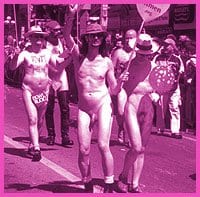The Toronto Police Services Board has dismissed a complaint about nudity in last year’s Toronto Pride parade.
But that doesn’t mean it approves of too much exposure. The board is investigating whether police in other cities arrest naked Pride participants and they’ll discuss the issue again later.
Board member Alan Heisey says he and his wife saw exposed genitalia at last year’s parade. He says it wasn’t a big deal for them but….
“The position of the board is that it was a big event. There’s a lot going on and the nudity wasn’t a big priority. That doesn’t mean it’s not a concern,” says Heisey.
The issue came up when the rightwing group REAL Women filed a complaint about nudity at Pride last year to Toronto police chief Julian Fantino. The chief then asked the board to advise him.
In his notes to the board, Fantino states, “clear direction was given within the operational plan that genital nudity would not be tolerated.” But no arrests were made – and there was genitalia nudity. Does that make sense?
“If there’s an obvious offence, we do have a responsibility to enforce the laws,” says Staff Insp Bruce Smollet of the service’s media team.
Pride co-chair Kyle Knoeck says there’s considerable debate on how to handle nudity. The committee doesn’t tell volunteers to stop nudists, but “would never tell people we can protect them from arrest.
“Some people don’t like nudity. Some people come to the parade to see nudity. In the end, it’s not an issue that affects the importance of the event,” says Knoeck.
Smollet admits that police have raised the issue with Pride organizers.
“It’s the same kind of pressure we put on the organizers of any large event. We do want a peaceful and orderly and enjoyable event,” says Smollet.
In New York organizers are stricter. Volunteers give verbal warnings to anyone who disrobes and police have stated they won’t tolerate nudity (though they haven’t in recent memory arrested anyone).
“There is an arrest policy, but there’s usually not enough [nudity] for police to notice,” says Russell Murphy, the fundraising chair for the New York City Pride group. “We warn people and that usually works.”
In San Francisco, police let organizers manage the event, naked bodies and all, “unless there is a threat to public order.”
“Our policy is to advise people that they must be cognisant of the law which exists, but we do not attempt to implement it or condone it,” says San Francisco Pride’s executive director Teddy Witherington.
Lawyer and nudist Peter Simm says it doesn’t matter what other jurisdictions do.
“I’m puzzled they [the Toronto Police Services Board] would ask about other cities, because the question is, ‘Is it legal?’ Because if it is clearly legal, which it is here, police have no cause to arrest anyone,” says Simm. “I have carefully analyzed all the laws in this area and in the particular circumstances of the Pride parade, nudity is legal.”
Public nudity is one of the few Criminal Code offences where police have to get written permission from the province’s attorney-general to lay charges. They can still arrest people, but because of the hassle of having charges laid, the incentive is lower than for arrests in other crimes.


 Why you can trust Xtra
Why you can trust Xtra


